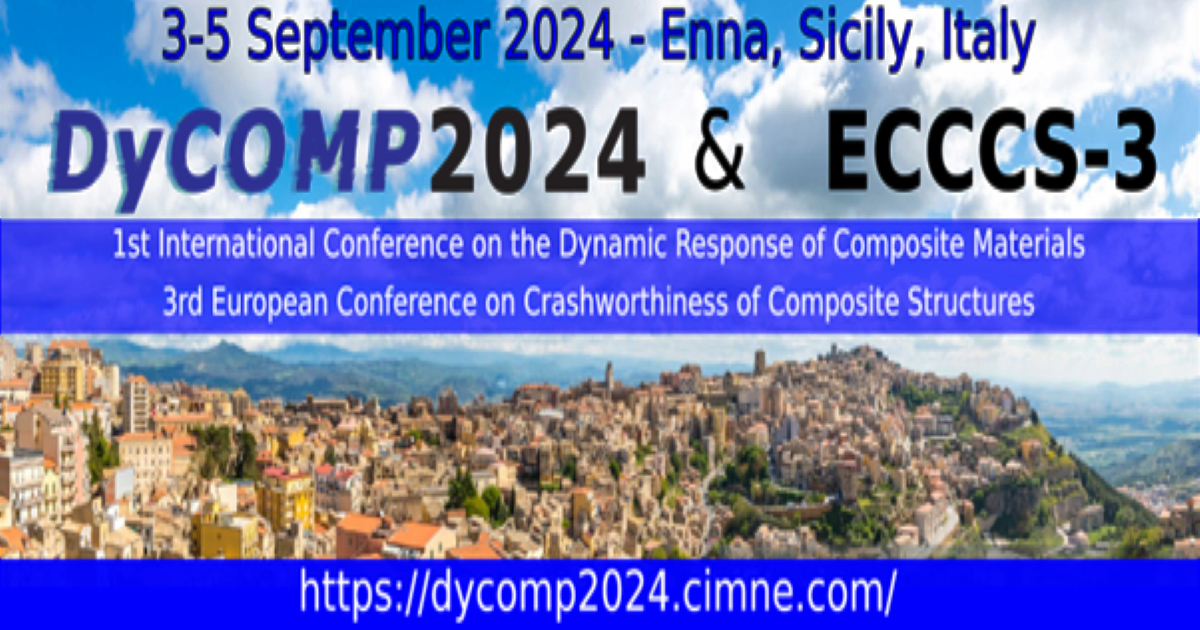Dynamic Behaviour and Crashworthiness of Composite Materials
A special issue of Materials (ISSN 1996-1944). This special issue belongs to the section "Advanced Composites".
Deadline for manuscript submissions: 20 August 2025 | Viewed by 78

Special Issue Editors
Interests: composites; crashworthiness; high-strain rate; impact
Interests: composites; crashworthiness; high-strain rate; impact
Interests: composites; crashworthiness; high-strain rate; impact
Special Issue Information
Dear Colleagues,
We are delighted to announce a Special Issue of Materials dedicated to the proceedings of DyCOMP 2024, the inaugural international conference focusing exclusively on the dynamic behavior of composite materials. This Special Issue provides a platform for the dissemination of high-quality research that advances our understanding of composite materials under dynamic conditions, bridging fundamental studies and applied innovations.
DyCOMP 2024 is uniquely aligned with the third edition of the European Conference on Crashworthiness of Composite Structures (ECCCS3), creating a synergistic environment in which to address critical challenges related to crashworthiness and dynamic performance. ECCCS, established under the ICONIC project, has garnered international recognition for fostering advancements in composite transportation systems.
We welcome contributions that explore innovative experimental methods, numerical modeling techniques, material characterization, and design strategies for composites in dynamic applications. Selected papers from DyCOMP and ECCCS3 will highlight groundbreaking research in crashworthiness, impact resistance, vibration response, fatigue behavior, and the structural optimization of composite systems.
This Special Issue aims to provide a comprehensive overview of innovations in dynamic composites, fostering collaboration among researchers and practitioners in order to drive future innovation in this evolving field.
We look forward to receiving your contributions.
Dr. Tommaso Scalici
Dr. Emilio Vicente Gonzalez
Dr. Giuseppe Catalanotti
Dr. Andrea Alaimo
Guest Editors
Manuscript Submission Information
Manuscripts should be submitted online at www.mdpi.com by registering and logging in to this website. Once you are registered, click here to go to the submission form. Manuscripts can be submitted until the deadline. All submissions that pass pre-check are peer-reviewed. Accepted papers will be published continuously in the journal (as soon as accepted) and will be listed together on the special issue website. Research articles, review articles as well as short communications are invited. For planned papers, a title and short abstract (about 100 words) can be sent to the Editorial Office for announcement on this website.
Submitted manuscripts should not have been published previously, nor be under consideration for publication elsewhere (except conference proceedings papers). All manuscripts are thoroughly refereed through a single-blind peer-review process. A guide for authors and other relevant information for submission of manuscripts is available on the Instructions for Authors page. Materials is an international peer-reviewed open access semimonthly journal published by MDPI.
Please visit the Instructions for Authors page before submitting a manuscript. The Article Processing Charge (APC) for publication in this open access journal is 2600 CHF (Swiss Francs). Submitted papers should be well formatted and use good English. Authors may use MDPI's English editing service prior to publication or during author revisions.
Keywords
- composites
- crashworthiness
- high-strain rate
- impact
Benefits of Publishing in a Special Issue
- Ease of navigation: Grouping papers by topic helps scholars navigate broad scope journals more efficiently.
- Greater discoverability: Special Issues support the reach and impact of scientific research. Articles in Special Issues are more discoverable and cited more frequently.
- Expansion of research network: Special Issues facilitate connections among authors, fostering scientific collaborations.
- External promotion: Articles in Special Issues are often promoted through the journal's social media, increasing their visibility.
- e-Book format: Special Issues with more than 10 articles can be published as dedicated e-books, ensuring wide and rapid dissemination.
Further information on MDPI's Special Issue polices can be found here.






